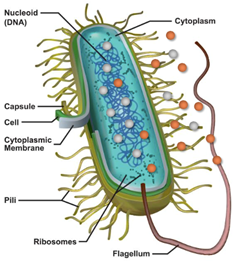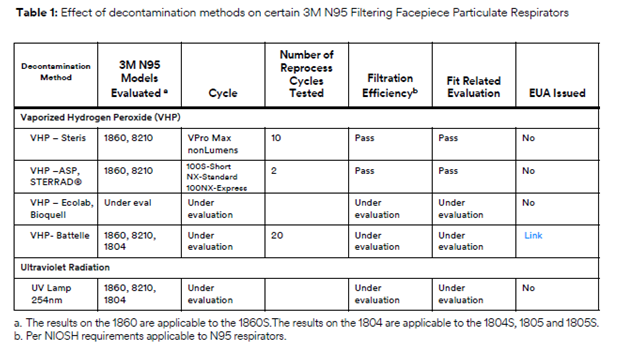
Coronavirus
Technology Solutions
April 7, 2020
How Effective is the Automobile Cabin Air
Filter?
Large-Volume Mobile HEPA Air Filtration System
Air Filtration near a Coronavirus Patient can
Prevent Infection and Even Reinfection
Filtration Group providing Many Products to
Mitigate Coronavirus
Porvair Filtration Group Supplying
Multiple Products to Mitigate Virus
3M Working on Decontamination Methods
__________________________________________________________________
How Effective is the Automobile Cabin Air
Filter?
The author asks us to,
consider that the coronavirus particulate
measures between .06 and .14 microns in
diameter. Most HEPA filters in today’s modern
vehicles can trap germs down to 0.3 microns,
which a coronavirus particulate will be able to
float right through. In this case, the filter
will do little to keep the coronavirus from
entering the cabin of your vehicle.

Note that this is counter to other articles such
as by Pall which talk about the Brownian
movement and capture of small particles in HEPA
filters.
The article also observes the limited number of
air changes per hour. It suggests that an
auxiliary air filtration system may be helpful.
JVC is a company known more for its audio
systems and Bluetooth speakers. They introduced
an air filtration system at the 2020 Consumer
Electronics Show (CES) in Las Vegas. Small
enough to fit in a typical car cupholder and
looking similar to a tall version of Amazon’s
Echo device, according to JVC, it can turn your
vehicle’s cabin air twice every hour. Whether it
is effective with germs from the COVID-19
outbreak remains to be seen.
Future tech is alive and under development at
Yanfeng Global Automotive Interiors. A supplier
to automakers around the world, they have
developed a “wellness pod” that cleans the air
within a vehicle while the car, truck or SUV is
not occupied. The device uses UV-C technology,
which is effective but has been found to
possibly cause cancer, which is why the vehicle
must not be occupied while the cleaning process
is occurring.
Large-Volume Mobile HEPA Air Filtration System
Deploying a (temporary) HEPA air filtration
system in large public places to help reduce the
spread of the coronavirus makes sense. For
government facilities, supermarkets, drug
stores, airport check-in areas and other places
that need to stay open, BlueSky offers temporary
HEPA air filtration systems designed to handle
up to 25,000 SCFM of contaminated air per
machine.
BlueSky Global is currently the only company in
the world that manufactures large mobile HEPA
air filtration systems that are ideal for
temporary use in enclosed settings such as
emergency isolation, temporary hospitals and
quarantine facilities.

The system can be installed in grocery stores
and fast food restaurants.

HEPA filtered air enters near the top of the
space and exits through the bottom.

https://www.bluesky-global.com/hepa-air-filtration-system/
Air Filtration near a Coronavirus Patient can
Prevent Infection and Even Reinfection
Blake Elias and Yaneer Bar-Yam
speculate that using air filtering near a
coronavirus patient may reduce the viral load in
the environment sufficiently to decrease the
probability of health care worker infection
through flaws in Personal Protective Equipment
(PPE). Further, they speculate that a
significant mode of disease progression occurs
through lung tissue re-infection through air
circulation in the environment of the patient.
The natural load of disease transmission from
one individual to another through the air could
serve as a mechanism of self-reinfection,
expanding the infection across multiple regions
of lung tissue. Motivated by this speculation,
it may be possible that reduction of the viral
load in the environment would lead to
substantial decrease of the severity of
individual disease. Moreover, it may be possible
to enhance this effect through breathing
exercises that exhale contaminated air in the
lung, decreasing further the viral load inside
the lung and its ability to cross contaminate
other parts of lung tissue. Finally, it may also
be possible to use tubes inserted in the mouth
or lung to suction contaminated air, to decrease
the severity of disease. These speculations
deserve attention because of the dramatic risks
that we face. Rapid action on evaluating the
validity of these ideas seems vital.
Every patient with a known or suspected
infection, whether in a hospital room or in
self-quarantine, could have a portable air
filter which they keep near or on their person
at all times. They may leave it by their bedside
while resting and may carry it with them as they
move around their room. The Center for Disease
Control is recommending that all persons under
investigation for COVID-19 be placed in an
Airborne Infection Isolation Room (AIIR) —
designated rooms in a hospital, connected to an
HVAC system in such a way as to have negative
air pressure. A critical question (which we seek
the community’s help answering): How many AIIRs
are there in the United States? In the world?
Should there become a shortage of AIIRs relative
to the number of patients who need them, a
cleanroom-grade air filtration system can be
used to turn any room into a negative pressure
isolation room.
While hospital HVAC systems contain HEPA
filtration, we propose that localized filtering
in high-traffic spaces may further decrease the
number of viral particles present. A low-cost
air purifier containing a HEPA filter can cost
on the order of $100 and circulate the air in a
155 square foot room five times per hour (i.e.
once every 12 minutes, or 120 times per day),
and could be deployed widely in hospital
environments. Hospitals may look into adding
HEPA filters to more places in their HVAC
systems, and for any existing HEPA filters, test
their current efficiency and replace if needed.
It may be worth taking any measures possible to
increase airflow speed in existing HVAC systems,
and to avoid recirculating air between rooms.
https://necsi.edu/could-air-filtration-reduce-covid19-severity-and-spread
Filtration Group providing Many Products to
Mitigate Coronavirus
In the McIlvaine webinar last week
a slide presentation by Jeff Mathers of
Purafil covering a unique filter media was
displayed.

More details were covered in our April 4 Daily
Coronavirus Alert.
We have been in discussions with Michael Bruce
of the Filtration Group relative to his analysis
of the total cost of ownership of HVAC filters
and how that can be expanded to take into
account
coronavirus removal.
Porvair Filtration Group Supplying
Multiple Products to Mitigate Virus
In response to Government calls for businesses
to support in the production and supply of
ventilators and ventilator components,
Porvair has rapidly adapted some of its
manufacturing processes in order to join forces
in the fight against Covid-19.
Ventilator and Breathing Apparatus
·
The Segensworth Division has been selected to
support Project Oyster (the British Consortium
of carmakers, Formula One teams, and airplane
manufacturers) who has been urged to build
10,000 ventilators. Porvair will be supplying
flat discs to be used as air filters, to protect
against dust ingestion.
-
The Wrexham Division is
manufacturing filter components
for several of the organizations
who are now building breathing
apparatus for hospitals.
-
The Caribou Division is
manufacturing and supplying
critical porous metal parts for
use within ventilators, clinical
analysers and respirators.
Medical Testing
-
The Sciences Division has
increased production of millions
of pipette tips to be used in
the United States for their
Covid-19 testing kits, as well
as supplying consumables for
dozens of US testing
laboratories.
-
Porvair
have supplied bulk
filtration media to one of their
German distributors to be
manufactured into filters for
the German Covid-19 testing
programme.
-
The Wrexham Division is
undertaking a rapid development
project to use existing DNA
extraction products and use the
technology to design and
manufacture RNA extraction kits.
Pharmaceutical Production
-
Porvair is
supplying chromatography
bed supports and pharmaceutical
grade water to pharmaceutical
customers whose production is
increasing.
-
Sister company Seal Analytical
is supplying water quality
testing kits and general
industrial filters to
pharmaceutical and chemical
reagent customers for their
requirements.
3M Working on Decontamination Methods
3M is working to quickly evaluate
decontamination methods on 3M respirator fit and
filtration performance, such as Vaporized
Hydrogen Peroxide, UV, Low Temperature Moist
Heat, amongst others, as reflected in the CDC
guidance on Crisis Standards of Care
Decontamination Recommendations. Other methods
of decontamination are being discussed in public
forums, including liquid chemical
decontamination, ozone, and time-based methods
but 3M is not prioritizing investigation of
these methods at this time. 3M remains committed
to providing data to the health care community
as soon as possible.
Considering the many variables involved in the
process, decontamination of FFRs in the US
should follow all requirements of the current
EUA issued for each specific decontamination
method.

